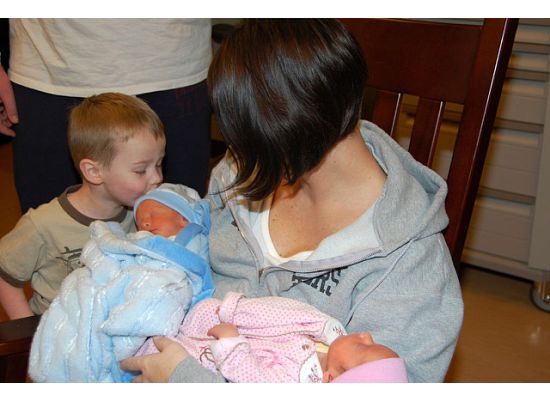My last pregnancy was very complicated. I was pregnant with triplets and lost one baby at 20 weeks gestation. I was placed on modified activity at 12 weeks. Bedrest came at 20 weeks and hospitalized bedrest for the last 6 1/2 weeks of my pregnancy. I was on a combination of medications to try to stop the contractions and buy the babies time in utero. Very early in the morning on the day that I turned 36 weeks, the contractions became increasingly more intense and it was evident that the babies would be born that day. Because I had to deliver our baby that had passed away, I had to have a c-section. I remember being wheeled back to the OR and being a nervous wreck. I had previously had a c-section with our oldest son, Noah due to him being transverse breech. Once in the OR, I noticed that it was packed full of people. There was a team of people for me, a team of four people each for Owen and Ella, and a representative from the morgue. It was very emotional for my husband and I.
I chose this example because I know that none of my babies would be here if I had not been watched so closely. There were severe complications that required immediate action. I am grateful that we have 3 beautiful children here on earth. I do not think that if this had been my first birth experience that I would have tried to have more children. I am very thankful for modern medicine and the expertice of the medical staff.
Netherlands-
In Netherlands, most women do not see an obstetrician. They see a midwife. Doctors only intervene in high-risk cases. More than half of Dutch women deliver at home. It is required that all women pick up all the medical supplies needed for a home delivery. If you wish to have a hospital birth, the midwife determines when you should arrive. Very few women get an epidural. Most anesthesiologists only work from 9am to 5pm. Many women go home the day of delivery with a home nurse provided and paid for by benefits. The home nurse not only helps with the baby, but cleans, cooks, and instructs on parenting skills.
My pregnancy was high-risk, so I would have been seen by an obstetrician and would have delivered at the hospital. Owen and Ella stayed for a week in the NICU, so I would have had to go home without them. I gained the insight that many deliveries are without complications. I am thankful that many babies are born without complications.

Thank you, for sharing your personal birthing experience. I find it interesting that the Netherlands, Switzerland, and many other countries are so supportive of families during the most important time in a mothers life. As a mother, I would have found this so helpful after the birth of my daughter, my second child and second caesarean. To have someone help you with the everyday chores would have been amazing, and the support many need today. This just might save a few woman from hurting their newborns or themselves.
ReplyDeleteThis week as I have read your posts I was thinking that you would have a most interesting blog! Thank you for sharing your own personal birthing experience with your second pregnancy. It certainly sounds as if your entire pregnancy and birthing experience with your triplets was mentally, emotionally, and physically demanding on your body and on your family. No doubt that any of us would not have had more children if that had been our first experience.
ReplyDeleteI find it fascinating that your research on the birthing experience in the Netherlands and my research on Serbia show opposite practices. While over half of the births in the Netherlands are home births with mid-wives, probably 95% of Serbian mothers deliver in the hospital. The Netherlands midwives that also provide the cooking, cleaning, and practical parenting instructions is fabulous! New moms really need that!
Thank you for reliving your own birthing experience for us to learn from.
I can imagine how difficult was that experience for you...
ReplyDelete